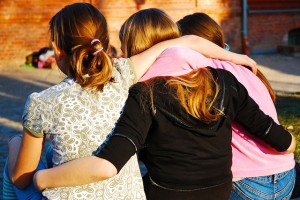Celebrating Friendships In Honour of Valentine’s Day
Most of us will be celebrating Valentine’s Day this month in one form or another and for many children it’s an opportunity to celebrate the friendships that surround them. That’s why in this month’s blog we’re looking at friendships and how we can support our children to build positive relationships with their peers.
Why Are Friendships Important?
It is generally accepted that peer relationships and friendships have a positive overall effect on children, and such relationships can impact long-term mental health, self-esteem and offer protection from bullying. The concern then for children on the autism spectrum, is whether their struggles with social skills may impede their ability to form friendships, and the effects that may result from minimal peer relationships over time.
If this is the case, how can we better support our children to build friendships and peer relationships that can, in themselves, help to promote social skills and provide support for life-long success?
What Challenges Do Children On The Autism Spectrum Face?
Firstly, we need to be aware of some of the common social skill challenges that children on the autism spectrum may face.
Many individuals living with autism experience difficulties in the following areas:
- Using or picking up on non-verbal cues. This can be many things from facial expressions, body-language, making eye-contact, gestures or changes in a person’s tone of voice.
- Observing and respecting personal space.
- Understanding non-literal language such as jokes or sarcasm.
- Using appropriate social etiquette such as taking turns, or listening to another’s point of view
Strategies To Help Your Child
Clearly, working on your child’s social skills will help them to learn how to make friends and build friendships. Start by identifying which specific social skill areas your child struggles with and which would have the biggest impact on his or her interactions with peers or friends. Working on just one or two key functional areas at a time is recommended, and you can try a mix of tools and strategies depending on how your child learns and what you have available. For example, if looking at taking turns, you can read books about it, use games to demonstrate, role play or find apps that teach taking turns. Start by working on one or two key skill areas that you feel are important and achievable and slowly build on success as you go.
At the same time, as your child starts to build his or her skills, finding opportunities for them to practice their new skills with peers or friends is key. If you can find play opportunities that expose them to other children who have more advanced skills in these areas, this can increase the chance that your child will imitate the modeled behaviour. To promote success, play dates should be planned with peers who are most likely to have common interests with your child and, ideally both children can be prepped to manage expectations and guide behavior before the play date. Having supervised activities which encourage interaction have been found to be beneficial to ensuring play date success too. Of course there are lots of other opportunities to make friends and practice social skills outside of planned play dates. Family get-togethers, neighbourhood BBQ’s, participation in group learning (e.g. swim classes), pair sports (e.g. tennis) and team sports (e.g. soccer or basketball) can all provide great opportunities to help your child to build the confidence and social skills necessary to form lasting friendships.
As always, please ask your FCPG Behavioural Consultant if you are looking for additional information, strategies and support in this area as they are here to help you.

